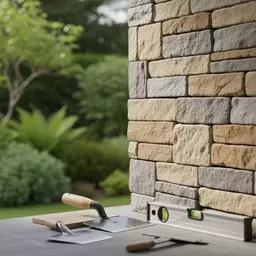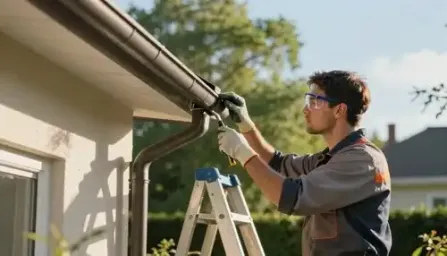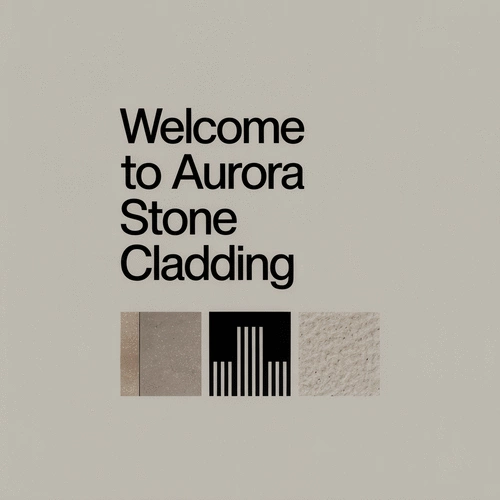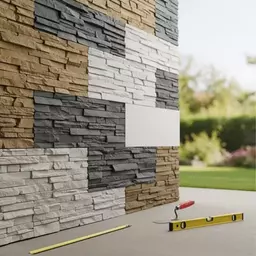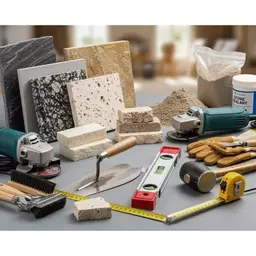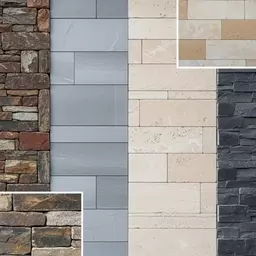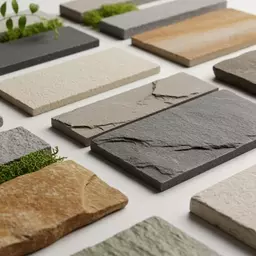Did you know that proper sealing can significantly extend the lifespan of your stone cladding? Ensuring your stone surfaces remain stunning and durable is essential for any homeowner. Let's explore the key insights that can help you maintain your stone cladding effectively.
What You Will Learn
- Sealants provide a protective barrier against moisture and stains, enhancing both aesthetics and durability.
- Different sealants have unique benefits; penetrating sealers are ideal for porous stones, while surface sealers enhance visual appeal.
- Neglecting to seal stone cladding can lead to issues such as water damage, mold growth, and aesthetic degradation.
- Choosing the right sealant involves considering stone type, porosity, desired finish, and performance characteristics.
Understanding Sealant Choices for Stone Cladding
This visual outlines key considerations for selecting the right sealant, differentiating between types, and highlighting factors for an informed decision.
Sealant Types & Applications
Penetrating Sealers
- Allow stone to breathe
- Excellent protection
- Ideal for porous stones (limestone, sandstone)
Surface Sealers
- Create protective layer
- Often glossy finish
- Ideal for decorative surfaces, high traffic
Common Sealant Formulations
- Silicone: Flexible, movement areas
- Polyurethane: Durable, weather-resistant
- Acrylic: Easy to use, interior
Key Selection Factors
Stone Type & Porosity
- Granite: Low porosity, less frequent sealing
- Marble: Higher porosity, robust sealant needed
- Limestone: Very porous, deep-penetrating sealer
Desired Finish
- Glossy: Enhances color (surface sealers)
- Satin: Subtle sheen, natural look
- Matte: Understated elegance, rustic styles
Performance Characteristics
- Waterproofing
- Mildew Resistance
- UV Resistance
- Breathability
Understanding the Importance of Sealants for Stone Cladding
When it comes to stone cladding, understanding the role of sealants is essential for achieving a long-lasting and beautiful finish. Sealants provide protective benefits that ensure your stone surfaces remain stunning and durable over time. By creating a barrier against moisture and stains, these products not only enhance the aesthetics but significantly increase the lifespan of your stone cladding. For more insights on maintaining your stone surfaces, check out our natural stone cladding care tips.
At Aurora Stone Cladding, we’ve seen firsthand how proper sealing can make a difference. Imagine walking up to your home, where the stone façade gleams even after a heavy rain—this is the lasting impact of a good sealant!
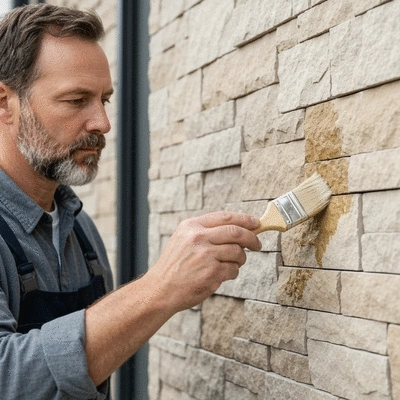
Why Sealing Stone Cladding Matters for Longevity
Sealing your stone cladding is crucial for several reasons, primarily focused on protection. Here are some key benefits of sealing:
- Stain Resistance: Sealants prevent oils, dirt, and other substances from penetrating the stone, keeping it looking pristine.
- Durability: A good sealant protects against wear and tear from environmental factors, extending the life of your cladding.
- Water Resistance: Sealants can create a waterproof barrier that helps prevent damage from moisture.
By investing in a quality sealant, you’re not only enhancing the beauty of your stone but also ensuring its integrity for years to come.
Common Issues Faced Without Proper Sealing
Neglecting to seal stone cladding can lead to several challenges. You might be surprised by how quickly problems can arise! Here are some common issues that can develop:
- Water Damage: Without a sealant, moisture can seep into the stone, causing cracks and deterioration.
- Mold Growth: Moisture retention can lead to mold and mildew, which not only looks unsightly but can also pose health risks.
- Aesthetic Degradation: Over time, unsealed stone can become stained and lose its original charm, leading to a costly and labor-intensive restoration.
Addressing these issues early on can save significant time and expense down the line. It’s clear that proper sealing is not just an option; it’s a necessity for maintaining the beauty and functionality of your stone cladding!
Types of Sealants for Stone Cladding: A Detailed Overview
Penetrating Sealers: Benefits and Applications
Let’s dive into the different types of sealants available. Starting with penetrating sealers, these products are designed to soak into the stone, creating a long-lasting barrier against moisture and stains.
- Benefits: They allow the stone to breathe while providing excellent protection.
- Ideal Applications: Perfect for porous stones like limestone and sandstone, which require deep penetration for effective sealing.
Using penetrating sealers not only protects your stone but also maintains its natural appearance. This makes them a popular choice for homeowners who want to preserve the authentic look of their stone cladding.
Surface Sealers: When to Choose Them
Surface sealers work differently from penetrating sealers. They create a protective layer on top of the stone, making them suitable for a variety of applications.
- Characteristics: Surface sealers often provide a glossy finish and excellent stain resistance.
- Best Applications: Ideal for decorative stone surfaces like countertops or areas with heavy foot traffic.
Choosing surface sealers can enhance the visual appeal of your stone while providing the necessary protection, making them an attractive option for many projects! For more information on different stone options, explore our article on stone cladding options for homes.
Adhesive and Sealant Comparisons: Choosing the Right Type
Now, let’s differentiate between various sealant formulations. Understanding the different types can help you make an informed choice for your specific needs.
- Silicone Sealants: Highly flexible, making them great for areas that experience movement.
- Polyurethane Sealants: Known for their durability and resistance to weathering, perfect for exterior applications.
- Acrylic Sealants: Easy to use and paintable, suitable for interior applications.
By understanding the strengths of each type, you can select the right sealant that meets both aesthetic and functional requirements for your stone cladding project.
Factors to Consider When Choosing a Sealant
Assessing Stone Type and Porosity
Choosing the right sealant begins with understanding the type of stone you’re working with. Different stones have varying levels of porosity, which influences sealant effectiveness.
- Granite: Low porosity, often requires less frequent sealing.
- Marble: Higher porosity, needs a more robust sealant to protect against stains.
- Limestone: Very porous, typically benefits from a deep-penetrating sealer.
Knowing your stone’s characteristics not only helps in selecting the appropriate sealant but also ensures that you maximize its longevity!
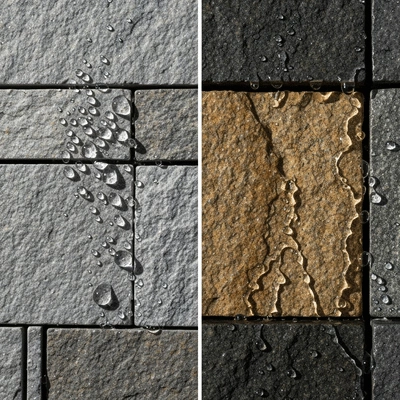
Desired Finish and Aesthetic Preferences
When considering a sealant, think about the finish you want for your stone cladding. The sealant can significantly influence the overall look of your stone surfaces.
- Glossy Finishes: Often achieved with surface sealers that enhance color.
- Satin Finishes: Provide a subtle sheen that still showcases the natural stone.
- Matte Finishes: Allow for an understated elegance, perfect for rustic styles.
Your aesthetic preferences should guide your sealant choice, enabling you to achieve the look you desire while ensuring protection.
Evaluating Performance Characteristics of Sealants
Finally, it's crucial to evaluate the performance characteristics of the sealants you’re considering. Not all sealants are created equal! Here are some features to keep in mind:
- Waterproofing: Essential for protecting against moisture-related damage.
- Mildew Resistance: Important for maintaining a clean and healthy environment.
- UV Resistance: Protects the stone from fading and degradation due to sunlight.
- Breathability: Allows moisture trapped within the stone to escape.
By choosing sealants with the right performance characteristics, you're investing in the long-term maintenance and beauty of your stone cladding!
Pro Tip
Choosing the right sealant can significantly impact the longevity and appearance of your stone cladding. Always opt for a sealant that is compatible with your stone type and its porosity. For instance, if you're using limestone, a penetrating sealer will provide the deep protection needed to prevent moisture damage, while a surface sealer might be more suitable for decorative applications like countertops.
Frequently Asked Questions About Stone Cladding Sealants
Why is sealing stone cladding important?
Sealing stone cladding is crucial for its longevity and appearance. It creates a protective barrier against moisture, stains, and environmental wear, preventing issues like water damage, mold growth, and aesthetic degradation.
What are the main types of sealants for stone cladding?
The main types are penetrating sealers and surface sealers. Penetrating sealers soak into the stone to provide protection while maintaining its natural look, ideal for porous stones. Surface sealers form a protective layer on top, often offering a glossy finish, suitable for decorative or high-traffic areas.
How do I choose the right sealant for my stone type?
Choosing the right sealant depends on your stone's porosity and type. For example, porous stones like limestone benefit from deep-penetrating sealers, while less porous stones like granite may require less frequent sealing. Consider the specific characteristics of your stone to ensure effective protection.
What are the risks of not sealing stone cladding?
Without proper sealing, stone cladding is susceptible to water damage (leading to cracks), mold and mildew growth (due to moisture retention), and overall aesthetic degradation from stains and environmental exposure. This can result in costly repairs and restoration efforts.
What performance characteristics should I look for in a sealant?
Key performance characteristics include waterproofing to prevent moisture damage, mildew resistance for a clean environment, UV resistance to protect against fading and degradation from sunlight, and breathability to allow trapped moisture to escape.
Summarizing Key Considerations for Choosing the Right Sealant
When it comes to selecting the right sealant for your stone cladding, there are several key considerations to keep in mind. Understanding the type of stone you have, its porosity, and the desired aesthetic are fundamental steps in ensuring a successful application. Let’s recap the main points we've discussed!
- Stone Type Matters: Different stones, like granite, marble, and limestone, each have unique properties that influence sealant effectiveness.
- Sealant Type: Choosing between penetrating and surface sealers depends on the specific needs of your project.
- Performance Features: Factors like waterproofing, UV resistance, and mildew prevention should guide your decision.
- Environmental Impact: Eco-friendly sealants can enhance both your project and the surrounding environment.
By considering these aspects, you can make informed choices that enhance the durability and beauty of your stone cladding!
Encouraging Informed Decisions for Stone Cladding Care
I invite you to take a moment to reflect on your needs. Assessing your stone cladding requirements will empower you to choose the right sealant confidently. Remember, every project is unique, and what works for one may not suit another!
Buyer’s Guide: Finding the Right Sealant Products
As you embark on your journey to find the perfect sealant, it's helpful to have a guide on what to look for. Here are some tips tailored to ensure your selection aligns with your stone type and project needs:
- Compatibility: Ensure the sealant is suitable for your specific stone type, whether it’s natural or engineered.
- Application Method: Consider how easy the sealant is to apply. Some may require professional installation, while others are DIY-friendly.
- Longevity: Look for products that promise durability and long-lasting protection to minimize maintenance.
- Reviews and Recommendations: Seek out user testimonials and expert reviews to gauge effectiveness.
By keeping these factors in mind, you can confidently select a sealant that meets your requirements and enhances the beauty of your stone cladding project! For a deeper dive into the differences between stone types, read our guide on natural vs engineered stone cladding.
Call to Action: Explore Our Recommended Sealant Products
Ready to dive into the world of sealants? At Aurora Stone Cladding, we’ve curated a selection of recommended sealant products that cater to various stone types and project needs. Check out our suggestions and choose a sealant that aligns with your specific requirements for a stunning, durable finish!
Recap of Key Points
Here is a quick recap of the important points discussed in the article:
- Sealants Enhance Longevity: Proper sealing protects stone cladding from stains, water damage, and wear, ensuring beauty and durability.
- Types of Sealants: Choose between penetrating sealers for porous stones and surface sealers for decorative applications based on your project needs.
- Assess Stone Characteristics: Different stones have varying porosity and properties that affect sealant effectiveness; understanding these is crucial.
- Performance Features Matter: Look for sealants with waterproofing, mildew resistance, and UV protection to ensure long-term maintenance.

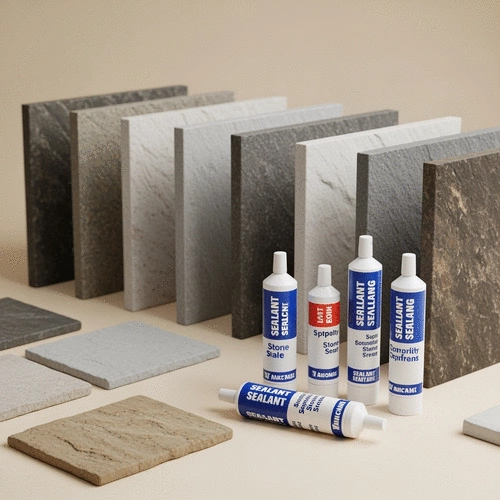
-t.webp)
